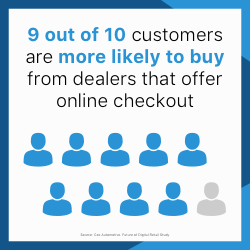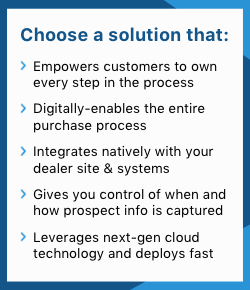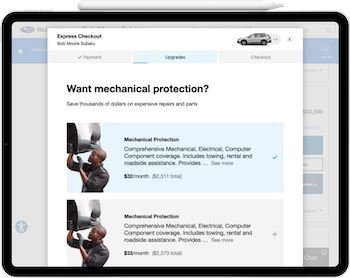Automotive Ecommerce: Four Must-Have Features for Every Dealer
The auto retail industry underwent profound change in response to the COVID-19 pandemic, with relentless technological innovation, and ever-evolving customer preferences, fundamentally changing how your buyers purchase cars.
As all of us in the automotive industry know, the typical legacy car buying process will simply no longer suffice, today’s car buyers want greater control over the process and the flexibility to jump into the process on their own terms and in their own time. They want instant access to all the information they need to make their decisions and efficiency. They value their own time and want auto retailers to do the same.
 Innovative retailers and dealer groups are working hard to meet these emerging customer demands and are deploying tools to create a customer-centric, technology-enabled car buying process. Those who have deployed the right combination of technologies, training, and processes are reaping the benefits, experiencing higher CSI scores, greater profit per vehicle, higher sales team throughput, and lower overall overhead. They are creating a seamless online and showroom experience for their customers and out-performing their competitors.
Innovative retailers and dealer groups are working hard to meet these emerging customer demands and are deploying tools to create a customer-centric, technology-enabled car buying process. Those who have deployed the right combination of technologies, training, and processes are reaping the benefits, experiencing higher CSI scores, greater profit per vehicle, higher sales team throughput, and lower overall overhead. They are creating a seamless online and showroom experience for their customers and out-performing their competitors.
But to take full advantage of the new auto retail landscape, dealers must deploy the right tools and technologies. There is a broad range of ecommerce solutions out there, with a diversity of features and functionality. For auto retailers, the digital retailing tech put in place must deliver on several key capabilities. Below we highlight four business-critical capabilities every high-performance auto ecommerce solution must possess and provide some helpful questions for dealers and retailers currently evaluating solutions:
1. Puts the customer in charge of the process
The right ecommerce solution gives customers the freedom to start the process wherever and whenever they want. It gives customers control over where to start their car-buying process, whether that’s reviewing vehicle inventory, getting a trade-in estimation, evaluating financing options, or exploring delivery options. And importantly, it does not force prospects to enter personal information before they are comfortable doing so but rather gives the dealer the ability to request such information when they deem it appropriate.
- Question 1: Does this solution let prospects choose where to start their journey, from choosing F&I products and accessories and calculating payments to receiving trade-in estimates and evaluating their finance options?
- Question 2: Does this ecommerce solution allow you to choose when in the process prospects are asked for their name, email address, and personal information to maximize conversions?
2. Makes the process frictionless
The right ecommerce solution empowers customers to easily perform any step in the car-buying process either online, in the showroom, or a mix of both. If they’d like to do some steps online and some in-person, the experience should be seamless, and the customer should never be burdened with having to repeat themselves or “do something twice.” And while they’re online, at every step, the experience should be fully integrated with the retailer’s website and never force the customer to “leapfrog” to a separate website or open up a new tab.
- Question 1: Does this solution let customers conduct every step of the car-buying process digitally and enable them to switch over and pick-up the process in the showroom at any point?
- Question 2: Can this solution integrate natively with my existing dealer website so customers are not forced to traverse different sites for each different step in the process?
3. Drives transactions...not simply leads
The right ecommerce solution is not simply an online marketing or lead generation tool, but rather is an actual transaction engine. It should digitally support all of the essential aspects of an auto purchase, not simply offer the ability to review inventory and capture the customer’s email.
The solution should support “hard” credit pulls, provide financing option packages for review, enable “end-to-end” management of the trade-in process, and support digital signatures across the entire process. These capabilities streamline the buying process for customers, empower your sales team to spend more time engaging each customer, and drive greater sales throughput.
- Question 1: Does this solution let customers receive, review, and accept actual trade-in and financing offers digitally, without having to interact with your staff?
- Question 2: Can this solution support an interactive, adjustable F&I and accessories workflow to optimize add-on revenue?
4. Keeps your dealership agile & future-proof

The right ecommerce solution not only empowers auto retailers to succeed today, it also positions them for continued innovation and growth. Technology will continue to advance, and customer expectations will continue to evolve: The ideal solution is designed to let retailers deploy their ecommerce architecture quickly, integrate it with existing tools and systems seamlessly, and not be forced to commit to long-term contracts or commitments.
- Question 1: Is this solution available as an enterprise-class software-as-a-service with appropriate contract lengths?
- Question 2: How long does the solution take to deploy? Does it easily integrate with our existing website, finance, CRM, F&I, and inventory systems?
Secure your future success
Digital retailing and ecommerce is transforming the auto industry, and innovators are deploying next-generation ecommerce solutions to differentiate themselves from the competition.
Though there are a wide variety of tools and technologies available in the marketplace - and it can seem overwhelming - retailers who evaluate their options in the context of the capabilities described above will be well-positioned for success!
Want to find out how to make the above possible with Modal's easy, seamless and native implementation? Reach out to us today for a Demo here!
Sources: Future of Digital Retail Study, Cox Automotive.
Jump to section
1. Automotive Ecommerce: Four Must-Have Features for Every Dealer
2. Speed & Empowerment: What the Digital Transformation Means for Auto Dealers & How to Succeed
3. Leads vs. Transactions: The Secret to Turning Your Dealership into an Ecommerce Engine
4. Auto Ecommerce Best Practices: Essential Capabilities to Maximize PVR
Request a demo today




